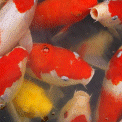
Koi ponds and organic wastes
If we ignore the fate of metabolic ammonia for a moment and concentrate on the organic matter, it will be easier to understand how these pollutants can affect the long term health of our koi if we have a clear idea of what happens to them in the pond. To do this we have to understand a little about fungi and bacteria, Nature's rubbish disposers. We tend to think of microorganisms such as fungi and bacteria as being disease-causing agents but, in truth, relatively few of them are pathogenic (disease-causing). Indeed, without the continued decomposing actions of these microorganisms, the planet Earth would by now be covered with a layer of sewage several miles deep!
Heterotrophs & autotrophs

We can divide microorganisms into two basic types. First are those that need a supply of ready-made organic carbon to provide them with energy and the building blocks for other molecules such as amino acids. Organisms that require organic carbon, which includes humans, are called heterotrophs. Some microorganisms and all plants can extract carbon from inorganic carbon dioxide. These are called autotrophs. This distinction between the modes of nutrition of various micro-organisms is important because an environment that encourages one type of micro-organism -for example, autotrophic nitrifying bacteria - may be unsuitable for heterotrophs such as Aeromonas bacteria and vice versa.
 |
There are two distinct types of bacteria involved with pond filtration.
heterotrophs - feed on organic matter such as fish waste and mulm
autotrophs feed on inorganic compounds such as ammonia & nitrite
|
Mineralisation
Solid organic matter, such as fish waste, is broken down in a series of steps by heterotrophs into progressively simpler compounds. Most of the initial decomposition is done by fungi, which use enzymes to break down the larger, complex organic molecules into simpler, soluble nutrients that the fungi can reabsorb. This process of using enzymes to break organic matter into smaller molecules is carried out by all microorganisms, each time producing a different organic compound, until finally the original matter is converted into basic non-organic components such as nitrogen, potassium and phosphorous. This whole process of converting organic materials into non-organic matter is called mineralisation.
The ultimate fate of these inorganic elements is to be converted back into organic matter, usually by plants and other autotrophic organisms, and the whole cycle starts all over again. While the biology of decomposition may be mildly interesting, the important point is that it is carried out in many stages, requiring large numbers of different species of microorganisms that produce a wide range of different organic compounds in the process.
Ideally there would be little in the way of 'free' organic compounds


In an ideal situation, the rate of mineralisation would be matched by the production of organic materials and there would be little in the way of free organic carbon compounds (or other pollutants) in the surrounding water. But, unless our filtration and pond husbandry is designed to remove these organics at the same rate as they are produced, there will be a small but often significant level of free organics. As a direct consequence of this mild form of pollution a rising DOC level - the following problems may be encountered:
- excessive algal growth leading to either green water from free-floating algae or dreaded blanketweed. These aquatic plants (or weeds, depending on your point of view) will thrive on the non-organic products of mineralisation, such as nitrate and phosphates
- high levels of heterotrophic bacteria, which is as good a time as any to point out that many of the common pathogenic bacteria (such as Aeromonas and Pseudomonas) are actually opportunistic heterotrophs. This means they are usually present in the pond feeding as decomposer organisms but can, if their numbers are high enough or conditions are right, turn their attention to the fish. The classic example is when fish are stressed and the normal defence systems are weakened. While it would be impossible and undesirable to eliminate these opportunists entirely, I think that most people would agree there is no point in encouraging them either!
- high levels of ectoparasites such as flukes and protozoa. These parasites thrive in waters with a high organic load and, because some of them feed on bacteria, the presence of high levels of bacteria will encourage an increase in parasites
- there is some evidence that water with a high organic load can depress the immune system. However, this may be a result of the increase in parasite and bacteria levels, or it could be that some organic compounds produced during mineralisation are stressful to fish.
- organic matter consumes a lot of oxygen while it is being oxidised or decomposed which could, under certain conditions, be detrimental to the well-being of the fish
- high organic loads are also implicated in environmental gill disease, a serious and relatively common koi health problem
- increased levels of organic compounds can make the water look mucky, often resulting in foam being produced at water returns, e.g. filter outlets and waterfalls.






